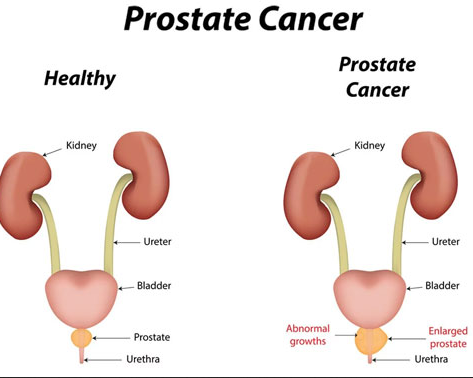Prostate Cancer Overview, Causes, Risk Factors
When cells in your body begin to grow uncontrollably, there is a risk of cancer; so cells in any body part can develop into cancerous cells. Prostate cancer develops when the cells of the prostate gland grow abnormally. Only males have this gland that produces the fluid in semen; it is situated beneath the bladder.
Prostate cancer can be of different types, almost all are adenocarcinomas. Others may be transitional cell carcinomas, neuroendocrine tumors, and sarcomas; they are rather uncommon. While most prostate cancers are found to grow slowly, some can spread fast.
Symptoms To Watch Out For Early Diagnosis
This type of cancer typically shows no visible symptoms in the initial stages. When these do become evident it is usually BPH or Benign Prostatic Hyperplasia, or as an enlarged prostate. The most common symptoms that can help you diagnose this condition early are:
- frequent urination
- pains in the lower pelvic region
- difficulty in urinating or associated pain and burning
- poor urinary output, haematuria or blood in the urine
- loss of appetite
- painful ejaculation
- weight loss
- bone pains
These symptoms are usually found when the cancer is in the advanced stages, and are usually triggered by some other medical condition. For instance, the difficulty to urinate maybe because of BPH; however, you need to keep your doctor informed about this so as to treat it in time.
Prostate Cancer Treatment: Choose What’s Best For You
All patients suffering from prostate cancer cannot benefit from the same kind of treatment. While some tumors progress rapidly, others may not grow at all or may progress at a much slower pace which might not require medical intervention. So, your doctor can advise you on what is the best prostate cancer treatment for you. He will take this decision based upon certain factors like:
- Age, lifestyle habits and overall health conditions
- How large your tumor is and whether the cancer has spread to other body parts
- Possible risks and side-effects
- How you feel about an immediate treatment
- The chances of cancer cure with treatment
Most common prostate cancer treatments are as follows:
- Watchful Waiting: This works when the tumor is small and grows slowly; you can wait for the symptoms to show before starting treatment. You can undergo routine PSA or prostate-specific antigen tests, rectal exams, blood tests, biopsies and ultrasounds for monitoring the condition.
- Surgery: This works when you are healthy and cancer has not spread already. Here, the doctor can decide to get rid of the prostate gland, or the gland and the surrounding tissue. Possible side-effects may be difficulty controlling urine and erectile dysfunction.
- Radiation: In this, high-energy X-ray-like beams are used to kill cancerous cells; this works best for elderly patients or those having other health issues. Sometimes, radiation is needed to eliminate any cancer cells left after surgery.
- Hormone Therapy: Since prostate cancer cells require male sex hormones for growth, this method is used to prevent the cells from getting hormones. The treatment reduces testosterone and other male hormone levels.
- Cryotherapy: For prostate cancer that is detected early, this can work as the doctor seeks to kill the cells through freezing. Probes and needles are used for transmitting extremely cold gas for destroying the cancer cells.
- Chemotherapy: This method is aimed at using drugs for killing the cancer cells; the drugs can be taken orally or injected in the bloodstream. The therapy is recommended for people with advanced cancer or if cancer has spread.
- Bone-directed treatment: When cancer reaches bones, there are medicines to ease the pain and prevent breakage.
- Cancer Vaccines: These will boost immunity to ward off infection. This is likely to work when hormone therapy fails to yield desirable results. The vaccine is custom-made and is known to increase longevity.
When To Go See Your Doctor
Since the symptoms of prostate cancer do not surface during the early stages, it may be hard to diagnose the condition early on. Screening is done to test for diseases when there are no visible signs and symptoms, for instance, the PSA and DRE or digital rectal examination test for prostate cancer. But, these are also not perfect and results may be inaccurate because of some infection or BPH condition. So, you need to consult a healthcare provider regarding the best test suggestions for you.
You can get screened when you are a male above 55 years of age, of African-American descent, or with a history of prostate cancer in the family. The PSA and DRE tests can help in early detection so that treatment can be initiated early and restricting the spreading of cancer. So, even if you are in your 30s or 40s, and experience any of the common prostate cancer symptoms, you must not hesitate to get yourself checked by a doctor. Symptoms do not indicate that you have cancer; but, if you have extreme pain or bloody discharge, it’s rather advisable to seek immediate medical attention.

Leave a Reply